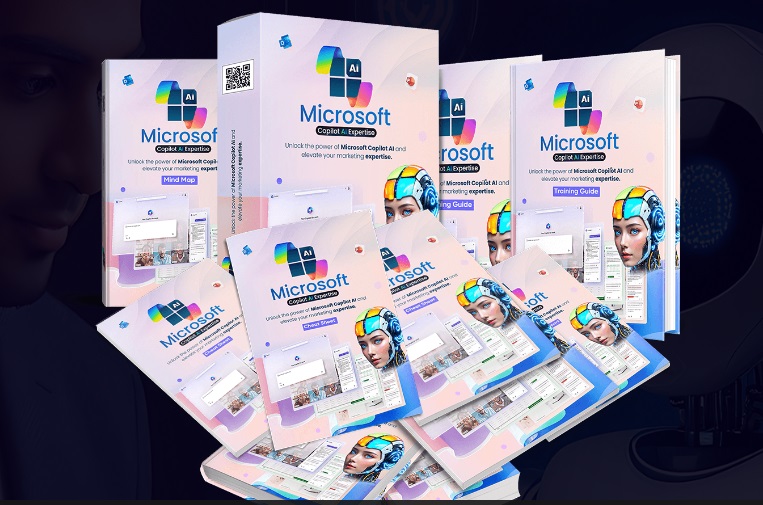
Unlocking Creativity: A Review of Microsoft Copilot AI Expertise
In a world where innovation is driven by collaboration between humans and machines, Microsoft Copilot emerges as a transformative tool, promising to revolutionize the landscape of software development. Leveraging the power of OpenAI’s GPT (Generative Pre-trained Transformer) models, Copilot serves as an AI-powered pair programmer, assisting developers in writing code more efficiently, accurately, and creatively.
Introduction of Microsoft Copilot AI Expertise:
Microsoft Copilot represents a paradigm shift in the way developers interact with code. It is based on the concept of “pair programming,” where two programmers work together on the same code, one writing code while the other reviews, critiques, and provides suggestions. However, with Copilot, one of the pairs is an AI, trained on a vast corpus of publicly available code repositories and programming languages.

>>Click instant access and other details<<
Understanding of Microsoft Copilot AI Expertise:
At its core, Copilot is an AI-powered code completion tool integrated directly into popular Integrated Development Environments (IDEs) like Visual Studio Code. It functions by analyzing the context of the code being written and generating suggestions in real-time. These suggestions range from completing entire lines of code to offering helpful comments and documentation.
The remarkable aspect of Copilot lies in its ability to understand the developer’s intent and context, allowing it to generate highly relevant and syntactically correct code snippets. This is made possible by its pre-training on a diverse range of codebases, which enables it to draw from a wealth of programming knowledge when generating suggestions.
Key Features and Capabilities of Microsoft Copilot AI Expertise:
Natural Language Understanding:
Copilot excels in understanding natural language commands and context. Developers can simply describe the functionality they desire in plain English, and Copilot will generate the corresponding code snippet.
Code Autocompletion:
Copilot provides intelligent code autocompletion suggestions based on the code context. It anticipates what the developer is trying to achieve and offers relevant code snippets accordingly.
Error Detection and Correction:
Copilot can detect potential errors in the code as it is being writing and offer suggestions for corrections. This feature not only enhances code quality but also serves as an educational tool for developers.
Code Summarization and Documentation:
In addition to writing code, Copilot can generate comments and documentation for functions and code blocks, improving code readability and maintainability.
Language Agnostic:
Copilot supports multiple programming languages, making it a versatile tool for developers working across different technology stacks.

>>Click instant access and other details<<
Implications for Software Development:
The introduction of Microsoft Copilot has profound implications for the field of software development:
Increased Productivity of Microsoft Copilot AI Expertise:
By automating repetitive coding tasks and providing intelligent suggestions, Copilot significantly boosts developer productivity, allowing them to focus more on solving complex problems rather than writing boilerplate code.
Knowledge Sharing and Learning:
Copilot acts as a knowledge repository, encapsulating best practices and coding patterns from diverse sources. Developers can learn new programming concepts and techniques by studying the suggestions generated by Copilot.
Code Quality and Consistency:
With its ability to detect errors and enforce coding standards, Copilot contributes to improving code quality and maintaining consistency across projects.
Accessibility and Inclusivity:
Copilot democratizes software development by lowering the barrier to entry for aspiring programmers and making coding more accessible to individuals with varying levels of expertise.
Challenges and Limitations of Microsoft Copilot AI Expertise
Despite its groundbreaking capabilities, Microsoft Copilot is not without its challenges and limitations:
Bias and Fairness of Microsoft Copilot AI Expertise:
Copilot’s suggestions may reflect the biases present in the training data, potentially perpetuating inequalities and underrepresentation in software development.
Security and Privacy Concerns:
Using Copilot involves sharing code snippets with third-party servers, raising concerns about data privacy and intellectual property protection.
Overreliance on Automation:
There is a risk that developers may become overly reliant on Copilot, leading to a decline in critical thinking and problem-solving skills.
Linguistic and Contextual Understanding:
While Copilot excels in understanding natural language commands, it may struggle with ambiguity and nuanced programming concepts, leading to inaccurate or misleading suggestions.
Conclusion of Microsoft Copilot AI Expertise:
In conclusion, Microsoft Copilot represents a groundbreaking advancement in AI-assisted software development. Its ability to understand natural language commands, generate contextually relevant code suggestions, and improve developer productivity holds immense promise for the future of coding. However, its adoption also raises important ethical, security, and pedagogical considerations that must be carefully addressed. As Copilot continues to evolve, it is poised to redefine the boundaries of creating and collaboration in software development.
